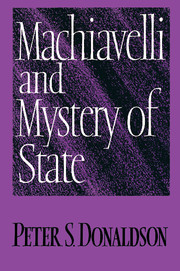Book contents
- Frontmatter
- Contents
- Preface
- 1 Machiavelli and Antichrist: prophetic typology in Reginald Pole's De Unitate and Apologia ad Carolum Quintum
- 2 Bishop Gardiner, Machiavellian
- 3 John Wolfe, Machiavelli, and the republican arcana in sixteenth-century England
- 4 Machiavelli and the arcana imperii
- 5 Gabriel Naudé: magic and Machiavelli
- 6 Biblical Machiavellism: Louis Machon's Apologie pour Machiavel
- Index
1 - Machiavelli and Antichrist: prophetic typology in Reginald Pole's De Unitate and Apologia ad Carolum Quintum
Published online by Cambridge University Press: 06 July 2010
- Frontmatter
- Contents
- Preface
- 1 Machiavelli and Antichrist: prophetic typology in Reginald Pole's De Unitate and Apologia ad Carolum Quintum
- 2 Bishop Gardiner, Machiavellian
- 3 John Wolfe, Machiavelli, and the republican arcana in sixteenth-century England
- 4 Machiavelli and the arcana imperii
- 5 Gabriel Naudé: magic and Machiavelli
- 6 Biblical Machiavellism: Louis Machon's Apologie pour Machiavel
- Index
Summary
In the Apologia ad Carolum Quintum (1539) Reginald Pole claimed to know, on the basis of a conversation with Thomas Cromwell some ten years earlier and subsequent inquiry into Cromwell's views, that Machiavelli's Il Principe had been the inspiration behind Henry VIII's decision to break with Rome, declare himself head of the church, and seize the property of the English monasteries. The Apologia remained unpublished until A. M. Quirini's edition of Pole's letters appeared (1744–57). After that, Pole's views were influential in fixing the image of the Henrician polity as Machiavellian in character. To A. F. Pollard, for example, Henry VIII was “Machiavelli's Prince in action.” Since 1905, however, when Paul Van Dyke devoted an appendix to his Renascence Portraits to an examination of the Apologia, it has been more common for historians to dismiss Pole's claim that Cromwell knew Machiavelli so early and made Il Principe the basis of his advice to Henry VIII. Many of Van Dyke's arguments were accepted by G. R. Elton in Tudor Revolution in Government (1953) and “The political creed of Thomas Cromwell” (1956).
Pole's views on Machiavelli appear in a work that, like the closely related De Unitate (1536, published 1539), is permeated by a typological vision of history. The events and persons of Pole's own time are seen as fulfillments or partial fulfillments of biblical models.
- Type
- Chapter
- Information
- Machiavelli and Mystery of State , pp. 1 - 35Publisher: Cambridge University PressPrint publication year: 1989
- 1
- Cited by



